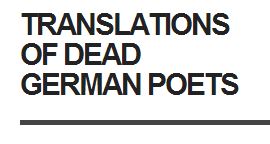 Yesterday was all rain and chill in New York City. So what better way to spend a damp evening than to go to The Bridge Series event hosted by Goethe Insitut. The Bridge Series “is the first independent reading and discussion series in New York City devoted to literary translation.”
Yesterday was all rain and chill in New York City. So what better way to spend a damp evening than to go to The Bridge Series event hosted by Goethe Insitut. The Bridge Series “is the first independent reading and discussion series in New York City devoted to literary translation.”
I was pleasantly surprise. I can be a tough critique when it comes to readings (meaning, normally they are incredibly boring). But these translators chose mighty fine selections and their discussion after the reading was quite interesting. The translators included Ross Benjamin, Isabel Fargo Cole, Tess Lewis, and Tim Mohr. All four are working from German to English.
The standout of this whole event was how exciting all of the selections were. If they are not already released, the novels will be available very soon this year in the US (the UK already has some available in translation). Also, for any Kafka aficionados out there, Ross Benjamin is currently working on a translation of Kafka’s complete Diaries.
There were two questions that most peaked my interest. The first being, what happens if the author includes a blatant error in the original. An example given was an author writing about New York City had listed Gansevoort Street as being down near the World Trade Center (when in reality, it is over west in the Meatpacking District). The original author did this because he liked the sound of the name. It was convenient that he is a contemporary author because the translator was able to discuss this point with him and it was subsequently corrected in the translation. But whether or not such a mistake should be corrected was discussed further with one of the most notorious errors: Frank Kafka putting a sword in the hand of the Statue of Liberty in his work, Amerika.
The second question was about how contemporary German literature (and foreign lit as a whole) has changed recently and how does that apply to translating. The translators hit upon the fact that many references are no longer solely Germany/Austria/Switzerland based. They also incorporate many North American trends and concepts. The translators didn’t weigh on whether they thought this was a good or bad thing but they did note that they didn’t have to look up as many culture reference anymore.
All in all, I was delighted to go to last night’s Bridge Series. I recommend it. Not only do they cover German literature but other languages as well. You can visit their website for more information.



![MP900444345[1]](https://acidfreepulp.wordpress.com/wp-content/uploads/2012/07/mp9004443451.jpg?w=225&h=300)
![MP900382748[1]](https://acidfreepulp.wordpress.com/wp-content/uploads/2012/03/mp9003827481.jpg?w=300&h=214)

![MP900315509[1]](https://acidfreepulp.wordpress.com/wp-content/uploads/2012/02/mp9003155091.jpg?w=300&h=201)

![MP900439466[1]](https://acidfreepulp.wordpress.com/wp-content/uploads/2012/01/mp9004394661.jpg?w=300&h=227)
